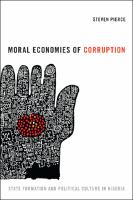Moral Economies of Corruption
Author(s)
Pierce, Steven
Collection
Knowledge Unlatched (KU)Number
103406Language
EnglishAbstract
Nigeria is famous for "419" emails asking recipients for bank account information and for scandals involving the disappearance of billions of dollars from government coffers. Corruption permeates even minor official interactions, from traffic control to university admissions. In Moral Economies of Corruption Steven Pierce provides a cultural history of the last 150 years of corruption in Nigeria as a case study for considering how corruption plays an important role in the processes of political change in all states. He suggests that corruption is best understood in Nigeria, as well as in all other nations, as a culturally contingent set of political discourses and historically embedded practices. The best solution to combatting Nigerian government corruption, Pierce contends, is not through attempts to prevent officials from diverting public revenue to self-interested ends, but to ask how public ends can be served by accommodating Nigeria's history of patronage as a fundamental political principle. This title was made Open Access by libraries from around the world through Knowledge Unlatched.
URI
http://library.oapen.org/handle/20.500.12657/37511https://library.oapen.org/handle/20.500.12657/37511
Keywords
corruption; politics and government; nigeria; history; politics; political cultureDOI
10.1353/book.64130ISBN
9780822374541, 9780822360773Publisher
Duke University PressPublisher website
https://www.dukeupress.edu/Publication date and place
Durham, 2016Grantor
Classification
History


 Download
Download Web Shop
Web Shop